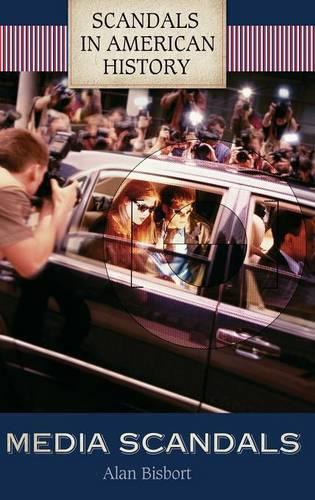
Media Scandals
(Hardback)
Publishing Details
Media Scandals
By (Author) Alan Bisbort
Bloomsbury Publishing PLC
Greenwood Press
30th September 2008
United States
Classifications
General
Non Fiction
302.23
Physical Properties
Hardback
264
Description
This fascinating volume offers an overview of the most influential and notorious media scandals, from newspaper publisher John Peter Zenger's groundbreaking 1735 trial for printing and publishing false, scandalous, malicious and seditious statements to Dr. Phil McGraw's 2008 thwarted attempt to force his television cameras inside Britney Spears' hospital room, from the attempts to ban literature by the likes of D.H. Lawrence, James Joyce, Henry Miller, and Allen Ginsberg to the excesses of gossip mongers like Walter Winchell, Hedda Hopper, Geraldo Rivera, and Matt Drudge. It delves into the tabloid press and walks through the minefields of political opinion shapers, the shouters, the muckrakers and whistleblowers. America's obsession with scandal-and the media's boundless capacity to report and sometimes even create it-did not start with O.J. Simpson, Rush Limbaugh, or Britney Spears. It was ingrained in the fabric of our nation even before Paul Revere made his famous ride. Indeed, our media's cherished right to free expression was hard-won and is now protected by the First Amendment to the U.S. Constitution, but it comes with responsibilities and is fraught with peril. The tension between the two forces of free expression and permissible subject matter has, throughout American history, caused media scandals-public outcries, legal proceedings, denunciations, violence and, in the case of Salman Rushdie's 1988 novel IThe Satanic Verses deaths. The early battles by the print media-newspapers, magazines, books-over censorship, book banning, book burning, obscenity, blasphemy and libel set the groundwork for even greater battles as the media expanded into radio, television and the Internet. This fascinating volume offers an overview of the most influential and notorious media scandals, from newspaper publisher John Peter Zenger's groundbreaking 1735 trial for printing and publishing false, scandalous, malicious and seditious statements to Dr. Phil McGraw's 2008 thwarted attempt to force his television cameras inside Britney Spears' hospital room, from the attempts to ban literature by the likes of D.H. Lawrence, James Joyce, Henry Miller, and Allen Ginsberg to the excesses of gossip mongers like Walter Winchell, Hedda Hopper, Geraldo Rivera, and Matt Drudge. It delves into the tabloid press and walks through the minefields of political opinion shapers, the shouters, the muckrakers and whistleblowers. Media Scandals examines this fascinating, troubled and sometimes inspiring subject from two different perspectives. First, through its recurrent themes, which reach across all media: politics; censorship; race and religion; sex and morals. The second half of the volume then examines each industry in more detail: book publishing; newspapers and magazines; radio and television, and the Internet. Augmenting this invaluable resource is a detailed timeline to help students put the wide-ranging scandals into historical perspective, and a thorough bibliography to encourage further research.
Reviews
. . . a nice jumping-off point for undergraduates interested in learning more about particular examples. . . this tome seems best suited to an undergraduate survey course in media studies where the aim is to expose students to an expansive discussion of scandal. * ARBA *
Author Bio
Alan Bisbort has authored or coauthored 16 books on history, biography, travel, as well as social and cultural issues. He has worked for the Library of Congress on World War II: A Library of Congress Desk Reference (2007). He is coauthor of The Nation's Library: The Library of Congress (2000), the official guide for the Library's bicentennial, and was a contributor to The Civil War: A Library of Congress Desk Reference (2002).
